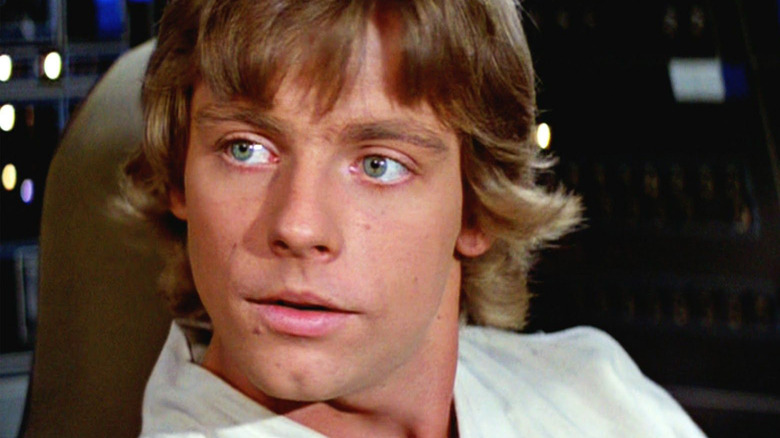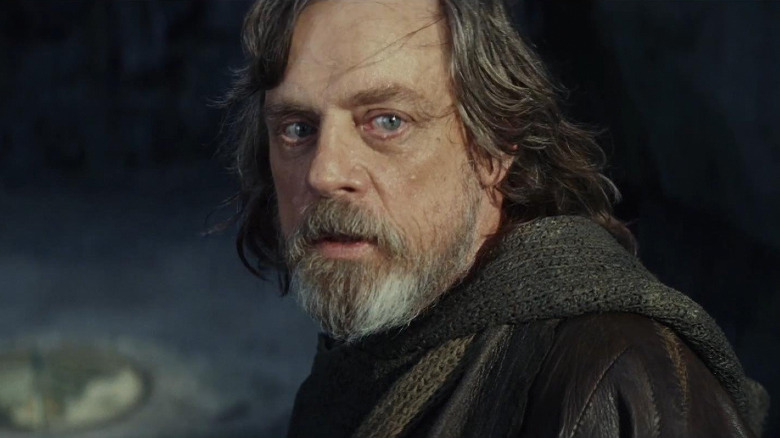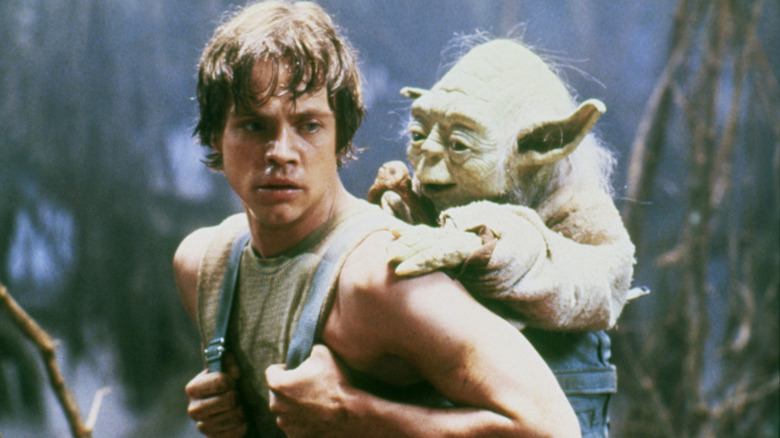Mark Hamill Reveals His All-Time Favorite Star Wars Movie
42 years after it first hit theaters in 1980, "The Empire Strikes Back" continues to cast a long shadow across the rest of the "Star Wars" franchise. In his review of the film's Special Edition re-release in 1997, Roger Ebert declared it the best of the first three movies set in a galaxy far, far away. "After the space opera cheerfulness of the original film, this one plunges into darkness and even despair, and surrenders more completely to the underlying mystery of the story," Ebert wrote. He went on to argue that it's only because of the dark emotions in "Empire" that the other two entries in the original "Star Wars" trilogy have taken on a "mythic quality" over time.
Agree with him or not, polls have shown, time and time again, that movie fans feel "The Empire Strikes Back" is not just one of the all-time great sequels, but also one of the all-time great Hollywood films in general. Even Luke Skywalker himself, actor Mark Hamill, told The Hollywood Reporter in April 2019 that, if forced to choose, he would have to go with "Empire" as his favorite "Star Wars" movie:
"It's like, pick your favorite child. You like them all for different reasons. I guess I'd have to go with 'Empire,' only because it was so unexpected to have the protagonist be so soundly defeated. Losing the hand and the dad Vader, all of it was pretty unexpected. And it was much more cerebral. Yoda is such an important addition to the mythology and I thought it was so clever of George [Lucas], the concept of the Force, so you can talk about religion and spirituality without making everyone uncomfortable. So, for that alone."
The trend of darker, divisive Star Wars sequels
For all the love it gets nowadays, it's easy to forget that, as highlighted by StarWars.com, "The Empire Strikes Back" initially divided moviegoers and critics over its darker story and themes. It also kicked off a trend of making the second entry in each "Star Wars" film trilogy more downbeat and character-driven than the chapters before them. This continued in 2002 with "Attack of the Clones," a movie in which a galaxy far, far plunges into civil war, all while Anakin Skywalker moves ever closer to becoming Darth Vader after murdering the Tusken Raiders who kidnapped his mother. 2017's "The Last Jedi" similarly has an older, more traumatized Luke living in exile after Kylo Ren's fall to the Dark Side, even as the First Order tries to wipe out the Resistance for good.
I won't rehash Hamill's critiques of Luke's arc in "The Last Jedi" or any of the other common criticisms of the film, if only because I suspect you're as tired of talking about them as I am. What I find more interesting is how the movie's divisive reception recalls the initial reactions to "Empire." Even "Attack of the Clones" drew polarizing responses upon its release, so far as those who liked "The Phantom Menace" go. Case in point: After praising the first entry in the "Star Wars" prequel trilogy, Ebert only awarded "Clones" two out of four stars, writing that its dialogue is the opposite of "inventive, stylish, and expressive." He went on to dismiss the film as a whole, calling it "a technological exercise that lacks juice and delight."
Will Empire ever be de-throned?
As with "The Empire Strikes Back," the general opinion towards the "Star Wars" prequel movies has improved with time. This re-evaluation can be partly credited to "The Clone Wars," a beloved animated show that enriched the prequel trilogy's characters and world-building. Similarly, the "Star Wars" franchise's reliance on nostalgia and shared universe storytelling in the post-Disney era has made it easier to appreciate George Lucas' efforts to break new ground with his prequel films. At the same time, the live-action "Star Wars" TV series' portrayal of the Tusken Raiders as more than poorly-disguised racial caricatures — coupled with their game-changing use of ILM's StageCraft tech — has only magnified the ways a movie like "Attack of the Clones" has not gotten better over the years, either in terms of its story or special effects.
Seven years out from the release of the first Disney-backed "Star Wars" film, "The Force Awakens," it's too early to tell how history will come to view this era in the property's run. The positive feedback loop of online discourse has likewise made it difficult for the discussions around "Rogue One: A Star Wars Story," "The Last Jedi," or any other "Star Wars" movie made since 2015 to evolve or shift in a different direction. Until that changes (and I wouldn't hold my breath waiting), it's hard to imagine "Empire" being de-throned as the top dog of a galaxy far, far away, so far as universal adoration goes. But perhaps that's only fair: to once again quote Ebert, "['Empire'] is a visual extravaganza from beginning to end, one of the most visionary and inventive of all films."


